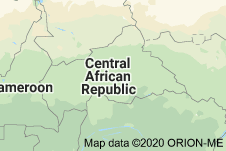
Central African Republic

Brief Overview
The Central African Republic, a landlocked country with a population of close to 4.9 million, embarked on a long recovery process, following a major security crisis in 2013 that unraveled its social fabric and displaced over 25% of its population.
Political Context
Elections in 2016 brought an end to three years of political transition and turmoil.
Since 2016, the Central African Republic has been governed by President Faustin-Archange Touadéra and Prime Minister Simplice Sarandji. The next presidential elections are scheduled to be held between December 2020 and March 2021.
On February 6, 2019, the Government of the Central African Republic signed an African Union-mediated peace agreement with 14 armed groups. This agreement has been endorsed by the international community. The African Union and the Economic Community of Central African States (ECCAS) serve as guarantors of the agreement, while the UN peacekeeping force (MINUSCA) plays a critical support role in the background.
Economic Overview

Central African Republic
Capital: Bangui
Population 4.7 million
Area 622,984 sq km (240,535 sq miles)
Languages French, Sangho (lingua franca)
Major religions Christianity, Islam, indigenous beliefs
Life expectancy 51 years (men), 55 years (women)
Currency CFA (Communaute Financiere Africaine) franc
UN, World Bank

Social Context and Development Challenges
Physical Contacts of the Presidency
Name of Minister:
Address:
Telephone:
Fax:
Physical Contacts of the Prime Minister’s Office
Name of Minister:
Address:
Telephone:
Fax:
Physical Contacts of the National Assembly
Name of Speaker of the House:
Address:
Telephone:
Fax:
Physical Contacts of the Chief Of State and Cabinet Ministers
Name of Minister:
Address:
Telephone:
Fax:
Physical Contacts of the Ministry of Interior
Name of Minister:
Address:
Telephone:
Fax
Physical Contacts of the Ministry of Justice
Name of Minister:
Address:
Telephone:
Fax:
Physical Contacts of the Ministry of Foreign Affairs
Name of Minister:
Address:
Telephone:
Fax:
Physical Contacts of the Ministry of Women’s Affairs
Name of Minister:
Address:
Telephone:
Fax:
Physical Contacts of the National Human Rights Commission
Name of Minister:
Address:
Telephone:
Fax:
Physical Contacts of the Police
Name of Inspector General:
Address:
Telephone:
Fax:
Physical Contacts of the Military
Name of Inspector General:
Address:
Telephone:
Fax:
Important Information of Key Human Rights Issues in Central African Republic
Number Prisons in Central African Republic
Number Prisoners in Central African Republic:
Secret Detention Centres:
Police Stations in Central African Republic
Corruption in Central African Republic
What are the current and ongoing human rights issues in Central African Republic
(1) Freedom of the Press
(2) Human Rights Defenders Issues
(3) Impunity
African Union (AU)
Joined the OAU
Signed the Constitutive Act of The African Union on:
Ratified:Instrument Deposited:
Signed:
Ratified:
Instrument Deposited:
Signed:
Ratified:
Instrument Deposited:
Signed: –
Ratified: –
Instrument Deposited: –
4.Protocol on Amendments to the Protocol on the Statute of the African Court of Justice and Human Rights
Signed: –
Ratified: –
Instrument Deposited: –
Signed: –
Ratified: –
Instrument Deposited: –
Signed: –
Ratified: –
Instrument Deposited: –
Signed: –
Ratified: –
Instrument Deposited: –
Signed: –
Ratified: –
Instrument Deposited: –
Signed: –
Ratified: –
Instrument Deposited: –
Signed: –
Ratified: –
Instrument Deposited: –
Signed: –
Ratified: –
Instrument Deposited: –
Signed: –
Ratified: –
Instrument Deposited: –
Signed: –
Ratified: –
Instrument Deposited: –
Signed: –
Ratified: –
Instrument Deposited: –